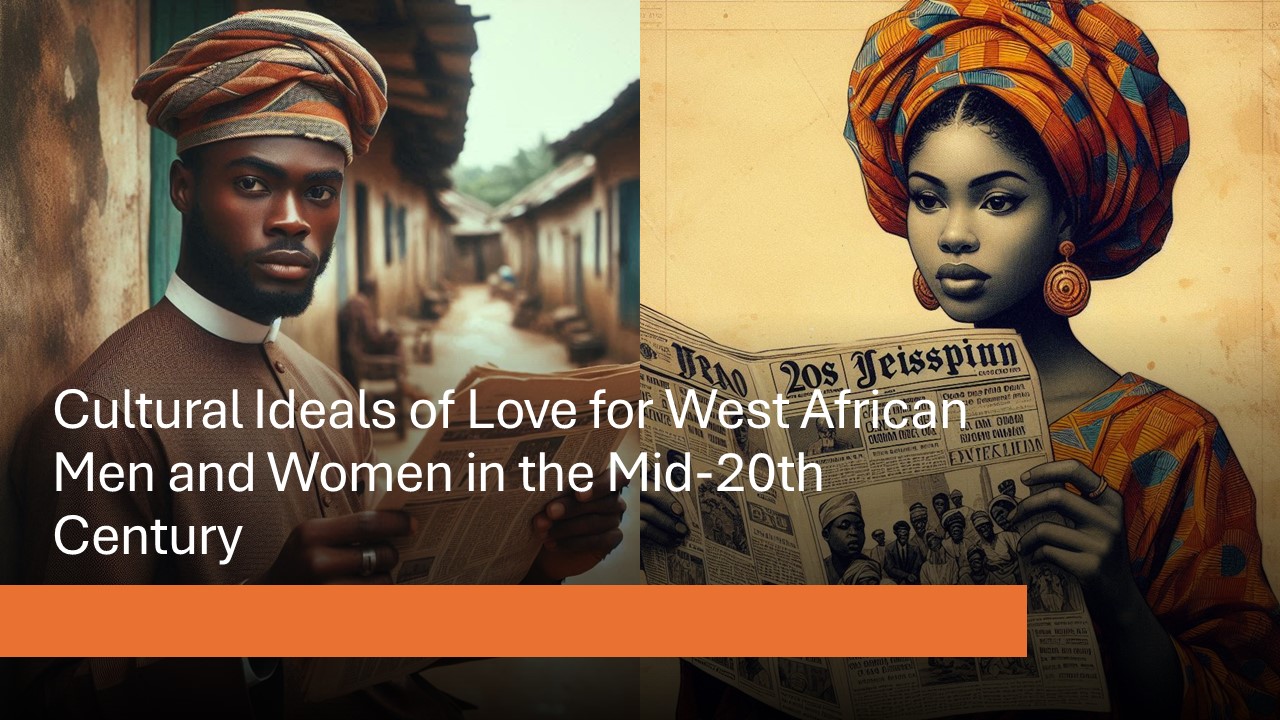Miss Silva, in her “Milady’s Bower” column of the West African Pilot newspaper in the mid-20th century, also talked about gender identity and the gendering of modern love at that time. Her readers and she discussed the cultural ideals of love for West African men and women.
The main point of advice on gendered love was that women did not love the same way as men did.
The gendered nature of love, as represented in the press, was, on the one hand, due to presumed universal biological differences between men and women and, on the other hand, due to cultural gender expectations learned in a Western African social context.
The public media portrayed corresponding gender roles in love and relationships. The gendered advice on love is clear in the way a woman or man is portrayed in terms of how they act, look, and stay calm.
Here are some poetic depictions of romantic women’s love. They represent the widespread notion that women are more passionate and devoted than men:
“A woman’s love is unquenchable. It lasts while she lives. I am not sure whether she ceases to love after death”
(quoted by Aderinto, 2015, p. 496).
or
“Man’s love is of man’s life a thing apart.” / “Tis woman’s whole existence.”
(quoted by Aderinto, 2015, p. 496).
The reference to men’s gendered nature was coined by another phrase describing men as inconsistent and unreliable in their love affairs.
These gendered typologies of love experiences and dispositions were evident in the different advice for men and women that Miss Silva gave.
What Were the Cultural Ideals of Love for West African Men in the Mid-20th Century?
A West African idea of “gentleman” shaped the modern masculinity of Nigerian urban men. Miss Silva portrayed the modern ideal man’s appearance conventions but noted that a man should value manners over looks. She praised the men’s good attitudinal and behavioral traits. To be a true modern lover, a man must be a “gentleman” and not be pretentious (Aderinto, 2015).
Modern West African men at that time needed more than gentlemanliness to attract and keep women. A good-looking appearance was not enough to get a girlfriend. Men must go to dance parties and movies. Miss Silva believed that when meeting a girl, a man’s behavior determined their chances of her falling in love with him.
Miss Silva believed that men’s faults were the cause of many broken relationships. She said that, in general, men aren’t as emotional as women and don’t have as much depth. Men say clearly what they think and feel in a relationship (Aderinto, 2015).
What Were the Cultural Ideals of Love for West African Women in the Mid-20th Century?
“Miss Silva” advised women on their modern gender identity and the new type of femininity, different from traditional rural patriarchal society. She encouraged them to pursue what represented normative modern womanhood and girlhood at that time. “Miss Silva” suggested that modern love was still gendered, but in a modern way (Aderinto, 2015).
Educating future African women was a good way to introduce modern female ideals. Miss Silva advised that a modern woman shouldn’t sacrifice her femininity for masculine attitudes and actions. She encouraged gender equality. However, while advocating for the abandonment of gender stereotypes, she discouraged women from losing their feminine qualities.
Modern West African women follow modern social norms in life, behavior, and relationships. They should be educated, self-sufficient, and employed. They need to be reserved and confident.
Cultural Ideals of African Womanhood
Miss Silva suggested that modern women’s lifestyles and demeanors should not be too British or African. An African woman had to find a good balance between European and African cultural traditions to be a good woman in the modern world.
Good women favor a relationship with decent, respectable, and responsible men. Miss Silva believed that a modern young woman should modernize long-held roles and old-fashioned ways of forming male-female relationships. Modern women no longer have to wait for a man to ask them out on a date. They should be confident in their ability to initiate a relationship in a gentle and subtle manner.
Miss Silva suggested that the psychological consequences of such an initiative for women should be positive rather than negative. Telling a potential attractive man how she feels is more important. Miss Silva encouraged women to talk about their feelings and break free from the “captivity of love.” She believed that the conspiracy of silence caused a lot of trouble in the past and should turn to a modern culture of relationships.
“Miss Silva” told pretty young women not to make the mistake of thinking that being beautiful was enough. The beautiful can be selfish and cold-hearted, so they may look unapproachable and unloved. Miss Silva said that being “simple” was more important than being beautiful. In conversation, women must be able to listen kindly to whatever a man has to say to her. They can respectfully refuse to listen to whatever it is without being rude.
When they are married, they should follow the virtues of contemporary African womanhood. They should become involved in church and community activities (Aderinto, 2015).
